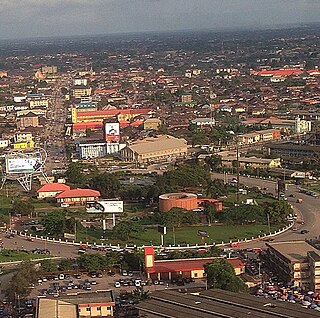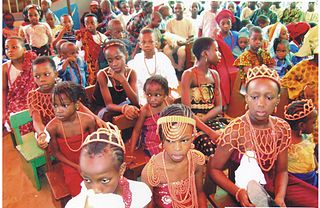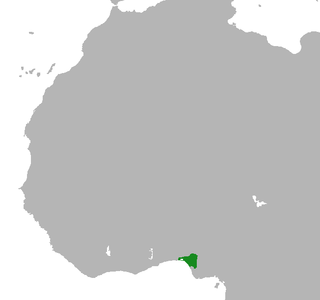
Benin City is the capital and largest city of Edo State, southern Nigeria. In central Kings square, the Benin city National Museum traces the Benin empire and has displays of terracotta sculpture. The Oba's palace is known for bronze plaques that once decorated with the walls, depicting historical events and Life at court. It is the fourth-largest city in Nigeria according to the 2006 census, after Lagos, Kano, and Ibadan. It is situated approximately 40 kilometres (25 mi) north of the Benin River and 320 kilometres (200 mi) by road east of Lagos. Benin City is the centre of Nigeria's rubber industry, and oil production is also a significant industry.
Idah is a town in Kogi State, Nigeria, on the eastern bank of the Niger River in the middle belt region of Nigeria. It is the headquarter of the Igala Kingdom, and also a Local Government Area with an area of 36 km2. Idah had a population of 79,815 at the 2006 census.

Igboland, also known as Southeastern Nigeria, is the indigenous homeland of the Igbo people. It is a cultural and common linguistic region in southern Nigeria. Geographically, it is divided into two sections by the lower Niger River: an eastern and a western one. Its population is characterised by the diverse Igbo culture and the speakers of equally diverse Igbo languages.

The Esan people (Esan: are an ethnic group of southern Nigeria who speak the Esan language. The Esan are traditionally known to be agriculturalists, trado-medical practitioners, mercenary warriors and hunters. They cultivate palm trees, Irvingia gabonensis, Cherry, bell pepper coconut, betel nut, kola nut, black pear, avocado pear, yams, cocoyam, cassava, maize, rice, beans, groundnut, bananas, oranges, plantains, sugar cane, tomato, potato, okra, pineapple, paw paw, and various vegetables.
The Ebira people are an ethnic-linguistic group of central Nigeria.

Benin art is the art from the Kingdom of Benin or Edo Empire (1440–1897), a pre-colonial African state located in what is now known as the Southern region of Nigeria. Primarily made of cast bronze and carved ivory, Benin art was produced mainly for the court of the Oba of Benin – a divine ruler for whom the craftsmen produced a range of ceremonially significant objects. The full complexity of these works can be appreciated through the awareness and consideration of two complementary cultural perceptions of the art of Benin: the Western appreciation of them primarily as works of art, and their understanding in Benin as historical documents and as mnemonic devices to reconstruct history, or as ritual objects. This original significance is of great importance in Benin.
The Afemai, also spelled Afenmai, are an ethnic group living in the northern part of Edo State, South-South geopolitical zone of Nigeria. Afemai people occupy six local government areas of Edo state: Etsako West, with headquarters in Auchi, Etsako Central, with the headquarters in Fugar, Etsako East, with the headquarters in Agenebode, Owan East with Afuze as the headquarters, Owan West with Sabongida-Ora as the headquarters and Akoko Edo,Igara being the headquarters. These make up the Edo-North Senatorial District.
Agenebode is a historical water-side town located by the banks of the Niger River in Edo State, South South part of Nigeria. It is the headquarters of Etsako-East local Government Area, the host of the local council and the traditional capital of Weppa Wanno Clan/Kingdom.
The Etsakọ people are the majority ethnic group in the northern region of Edo State, Nigeria. They are historically linked to the ancient Benin kingdom. Administratively, they presently occupy three local government areas of Edo State. These are: Etsako East, Etsako West and Etsako Central, with Agenebode, Auchi, and Fugar as their administrative headquarters respectively.
Emokweme is a town in Weppa Wanno Kingdom of Edo state, Nigeria with a population of approximately 20,000 people.

The Roman Catholic Diocese of Auchi is a diocese located in the city of Auchi, Edo State in the Ecclesiastical province of Benin City in Nigeria.

The Edopeople, sometimes referred to as the Bendel people, are an Edo-speaking ethnic group. The oredo who predominantly reside in 7 southern local government areas of the State of Edo, Nigeria are known as Benin. They are speakers of the bini language and are the descendants of the founders of the Benin Kingdom Ogiso Igodo. They are closely related to other southern Nigerian tribes, such as the Esan, Igbanke, the Etsakọ, the Isoko, and the Urhobo.
Akoko Edo is a Local Government Area in Edo State, Nigeria. Its headquarters is in the town of Igarra. It has an area of 1,371 km2 and a population of 262,110 at the 2006 census. The earliest settlers of Akoko Edo were the Benins who would have been there the same period the Etsako people moved from Benin during the reign of Oba Ozolua (1483-1504). Other migrating people, due to the fortunes of time, came into the area. Of the Igbirra and Idah from the North and East, the war which Oba Esigie fought in 1515-1516 with the Attah of Idah would have brought a lot of migration into the area.

Etsako West is a Local Government Area of Edo State, Nigeria. Its headquarters are in the town of Auchi. Etsako West is made up of six clans: Uzairue, Auchi, South Ibie, Anwain, Jagbe and Aviele.

The Kingdom of Benin, also known as the Edo Kingdom or the Benin Empire, was a kingdom within what is now southern Nigeria. It has no historical relation to the modern republic of Benin, which was known as Dahomey from the 17th century until 1975. The Kingdom of Benin's capital was Edo, now known as Benin City in Edo State, Nigeria. The Benin Kingdom was "one of the oldest and most developed states in the coastal hinterland of West Africa". It grew out of the previous Edo Kingdom of Igodomigodo around the 11th century AD, and lasted until it was annexed by the British Empire in 1897.
The Itsekiri language is a major branch of the Yoruboid group of languages, which as a group, is a key member of the Volta–Niger sub-family of the Niger–Congo family of African languages. Itsekiri is spoken by nearly 900,000 people in Nigeria as a first language and by many others as an additional language notably in the Niger Delta and in parts of Edo and Ondo states of Nigeria. The other key members of the Yoruboid group are Yoruba and Igala along with the various Yoruba dialects spoken in Benin and Togo.

Auchi is a city in Edo State, Nigeria.

Esanland, is a cultural region located in Edo State, Nigeria. It is composed of five Local Government Areas in Edo State. Esanland lies west of the banks of the Niger River. It is bordered by Kogi State, Delta State, Edo South Senatorial District, and Edo North Senatorial District. Esanland covers about 2,800 square kilometers and is home to over half a million people. The Esan people and culture of Esanland are generally homogenous.
Unuamen also spelt Unuame is an ancient village community by Ovia river in Ovia North-East Local Government Area of Edo State, Nigeria. Unuame is about 15 kilometres (9 mi) from Benin City and 20 kilometres (12 mi) from Benin Airport. Unuame is one of the ancestral homes of Oba Esigie's maternal grandfather and home town to some group of Binis. The people of Unuame have remained loyal to the monarch since the establishment of the ancient Kingdom of Benin. Being a part of the Kingdom of Benin, Unuame is at the heart of the tropical rainforest in the southern part of Nigeria, way to the west of the delta of the Niger River and inland from the coast.

Unuedegor is a community located along the banks of the Niger River in Etsako East local government area of Edo State in Nigeria. It is about eight kilometers north of Agenebode, where the Etsako East local government headquarters are located. Bordered on the east by Idah in Kogi State, with the River Niger in the middle of both communities, it is bordered on the west by Egor-Na-Ugeh along the Nigerian Railways tracks that run from Ajaokuta to Warri in Delta State, and in the north by Uzanu Community of the Uneme Kingdom.










